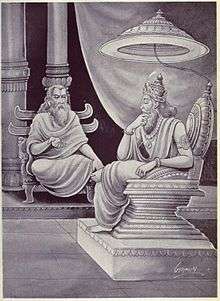Vidura
Vidura (Sanskrit: विदुर, lit. skilled, intelligent or wise) is one of the central characters in the Mahabharata, a major Hindu epic. He is described as the prime minister of the Kuru Kingdom and also the uncle of the Pandavas and Kauravas.
| Vidura | |
|---|---|
| Mahabharata character | |
 Vidura (left) with Dhritarashtra | |
| In-universe information | |
| Weapon | Sword |
| Family | Vyasa (father) Parishrami (mother) Dhritarashtra (oldest half-brother), Pandu (older half-brother) |
| Spouse | Sulabha |


Vidura's Role in the Mahabharata
Vidura was born from Niyoga- between sage Vyasa and Parishrami, a handmaiden to the queens-when the queens were scared of vyasa deva as he was not so handsome. Ambika and Ambalika. Ambika and Ambalika were wives of king Vichitravirya - the grandfather to Kauravas and pandavas; and the father of Dhritarashtra and Pandu. Barring Krishna, Vidura was most respected as an adviser by the Pandava, whom he forewarned on various occasions of Duryodhana's plots to exterminate them, such as Duryodhana's plan to burn them alive in the house of wax.
Except the prince Vikarna, Vidura was the only one who protested against the humiliation of Draupadi in the Kaurava court. In that moment, Duryodhana viciously rebuked Vidura, calling him ungrateful. Dhritarashtra moved to rebuke Duryodhana for insulting Duryodhana's uncle, but, remembering Vidura saying that a blind man cannot be king, holds his tongue, and instead reprimanded Duryodhana for insulting the prime minister. It is that incident that Vidura brought up years later when he severed ties with the Kurus and sided with the Pandavas at the onset of the Kurukshetra war. Unlike Bhishma, Dronacharya, Kripacharya, Karna, etc., Vidura did not have an obligation to Hastinapur or Duryodhana, but to his family. Hearing Dhritarashtra not acknowledge that relationship, Vidura felt compelled to side with dharma and the Pandavas.
According to Krishna, Vidura was considered as Dharmaraja, which means the Lord of truth. Krishna respected Vidura for his devotion to people's welfare and his proficiency in every sphere of knowledge.
When Krishna visited Hastinapura as a peace emissary of the Pandava, he shunned Duryodhana's offer to stay in the royal palace, preferring instead the home of Vidura, on account of him being the only neutral man in the Kaurava court. The reason Krishna stayed in Vidura's chambers for the night instead of Duryodhana's is due to the thoughts which were running through their heads and the difference between them. Duryodhana's intention was to heave luxury upon Krishna and convince him to join the Kaurava's side. Sensing this intention, Krishna refused. Krishna knew the food that Vidura presented was presented with love and affection with no ulterior motive.
In the Sanatsujatiya section of the Mahabharata, shortly before the Kurukshetra War began, Vidura invoked the sage Sanatsujata to answer Dhritarashtra's questions about death. In protest against the Kurukshetra War, Vidura resigned from the post of minister.
Legacy
Vidura is considered as the Mahachohan in the Theosophical world. Mahachohan is said to be the chief of a Social Hierarchy of the trans-Himalayan mystics. Most characters in the Mahabharata were reincarnations of one God or the other. Vidura was the reincarnation of Dharmaraja, more popularly known as Lord Yamadharmaraja, due to the curse of sage Mandavya. When Lord Vishnu decided to take birth as Lord Krishna, the lesser Gods too, for a ringside view of the action, took birth as someone or the other. It happened both in Mahabharata as well as in Ramayana. There in Ramayana, Narada was born as Vibhishana.[1]
Vidura-niti, or Vidura's Statecraft, narrated in the form of a dialogue between Vidura and King Dritrashtra, is considered the precursor in some ways of Chanakyaneeti.
Vidura is held to be a paragon of truth, dutifulness, impartial judgement and steadfast dharma. He is considered the embodiment of the inner consciousness of the Mahabharata. The curse carried by Narada was also transferred to Vidur. The curse that though he being bestowed with ultimate knowledge and wisdom about past, present and the future, he would not be believed.
In popular culture
Kaka Vidura, a Hindi minor poem by Rambhadracharya, has Vidura and his wife Sulabha as central characters.
Vidura Bhiksha , is a Malayalam poetry work by Ullur S. Parameswarayyar .
See also
References
1. The Mahabharata of Krishna-Dwaipayana Vyasa, translated by Kisari Mohan Ganguli, published between 1883 and 1896 2. The Vishnu-Purana, translated by H. H. Wilson, 1840 3. https://www.speakingtree.in/allslides/story-behind-the-birth-of-vidura/78300
- Parvathi Kumar, K., Wisdom Teachings of Vidura, 1997, Dhanishta

